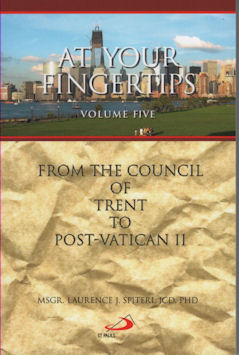
|
Posted
December 9, 2012
Book: At Your Fingertips: From the Council of Trent to Post-Vatican II Vol. 5 Author: Msgr. Laurence J. Spiteri St. Pauls. Staten Island, NY. 2012. pp. 216 An Excerpt from the Book:
An Excerpt from the Book: Leo XIII will be best remembered for his outstanding encyclicals and unabashed defence of the rights of working classes. As Cardinal Pecci, he began writing on the role of the Church in his contemporary society. He presented the Church as upholding the human dignity of the working class and opposing excessive industrialization for it oppressed poor workers. As Pope, he denounced social inequity and injustice in his landmark 1991 encyclical Rerum Novarum, taking the side of the working classes. In it he criticized the concentration of wealth and power; denounced the abuse of laborers and insisted that they be granted certain rights and safety regulations; commended labor unions; defended private property; condemned socialism and class struggle as legitimate principles to bring about change; and encouraged Catholics to join or form labor unions which were devoid of secular and revolutionary ideologies. Subsequent Popes would recall this ground-breaking encyclical and issue their own encyclicals and speeches rooted in it. Furthermore, Catholic social teaching, in turn, influenced political movements and Christian Democracy movements in many contemporary European countries. Table of Contents: The Council of Trent and its immediate aftermath Bring the Good News to all the world Grave tragedy -- man enslaving other men Crowns clash -- the quest for political supremacy Popes and fading empires The Church at the hands of the French Revolution Popes and rulers of a new Italy Vatican Council I Mariology A new mentality in missionary activity The Church and social issues Religious liberties Vatican Council II List of Popes from Council of Trent to the present day |
|
